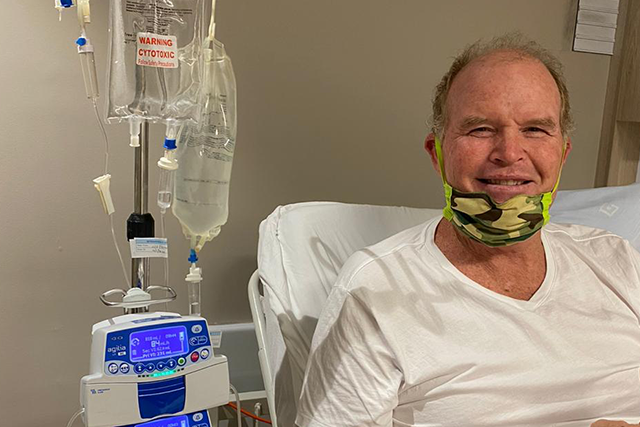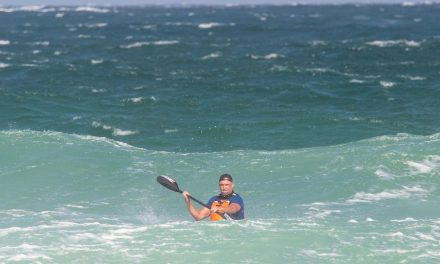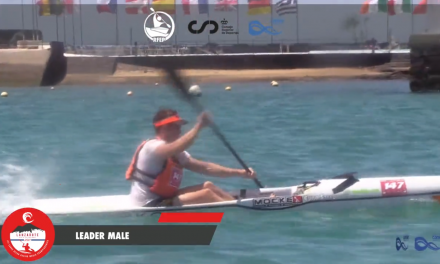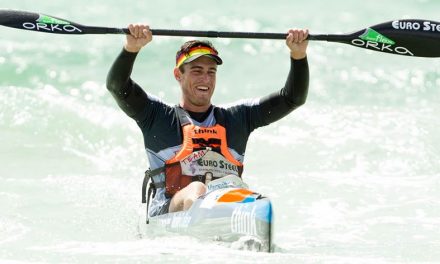THE BIG O’S BATTLE AGAINST THE BIG C
After a lifetime in the boat, Oscar Chalupsky could never lose sight of his love of paddling. Not even in the fight of his life.
“It’s basically your last race. It’s an important one to win, you know?” He says.
“You’ve just got to do whatever it takes.”
It’s of little surprise that his affable charm hasn’t waned either. Having received a diagnosis that would cause others to crumble, Chalupsky – the most accomplished and recognisable surfski paddler of all time – is just as upbeat and honest as ever.
“They say the one thing when you have cancer is that you want to don’t want to lose weight, otherwise you’re dying.
“I’m not at that stage. I’m actually putting on weight,” he laughs.
Speaking to him now, there’s no inkling of the daunting battle he faces. In fact, there was no inkling before the shock cancer diagnosis either.
After another jam-packed year of racing and coaching around the world, the now xx year-old fly down under for the Shaw and Partners WA Race Week. That’s when he began to notice something wasn’t right.
“I was in Perth racing flat out, but I couldn’t sleep at night at all because my back was causing so much pain,” Chalupsky recalls.
“I couldn’t sleep. Not even one hour. The only way I could sleep was standing up. I was taking every pain killer and nothing was working.
He didn’t notice the pain while paddling, but he did notice the performance.
“Guys that I would normally always beat were ahead me!”
A string of physiotherapy sessions provided no relief. By the end of the week, paddling too had become a struggle.
“I wasn’t going to race The Doctor because of the pain, but I thought, ‘I’m here and the wind is blowing,’ and I think I did pretty well on half power.”
He flew home to Portugal that night and had an MRI scan as soon as he landed. The results were not what he expected.
“And that’s where they saw the tumour pushing on my spine,” he says. “That’s why it was so painful.”
“Everybody had their theories, but when I got back I sent it to some mates, and they said, ‘you’ve got four to six months.’
“Everybody was upset, but I wasn’t upset. I said, ‘oh that’s fine, I don’t care,’ four to six months was better than one or two days, you know?”
It’s a brave outlook to adopt but it’s one that Chalupsky has harnessed his entire career. No challenge is too great and no outcome is impossible. That’s what lead him to pursue a second opinion in South Africa.
Doctors believed that the growth on his spine was a secondary tumour but they were unable to locate the primary source.
“They were going to cut the piece of the tumour out, but then just before they did, they checked my blood and realised I had multiple myeloma,” he says.
“They said, ‘alright, you’ve probably had this for a year and a half or two years.’ Before the Worlds, I had a rib problem and couldn’t paddle, then a shoulder problem and couldn’t paddle, and they said, ‘no, that’s all from the myeloma.’”
“I was on half power for quite a while, and that really pisses me off.”
His multiple myeloma, more commonly referred to as bone marrow cancer, was diagnosed as being somewhere between stages three and four.
“There’s no cure, but you normally last between three and five years. Some people have lasted a long time,” he says.
“But mine was very fast and aggressive, and different to a lot of people myelomas.”
The 12-time Molokai champion is comfortable sharing his experience.
“At the end of the day, if you don’t tell people, some people might not know they have it”
And like he did with all of those race wins, he’s simply put his head down and gotten to work.
Given the type of cancer, Chalupsky will undergo chemotherapy treatment for the rest of his life. It’s tough and it’s expensive, costing $17,000 AUD a month.
Thankfully, he says he is yet to feel overwhelmingly sick, and his already test results shown a marked improvement. The tumour on his spine his shrunk dramatically.
“Hopefully I’m getting stronger and hopefully I can start paddling again, and paddle even stronger.”
“They gave me steroids which is good, but now I’m sure they’re wearing off which is a pity,” he laughs.
Like any downwind race, challenges have come up along the way. Some have been small…
“When they radiated me they burnt my oesophagus, so it was quite hard eating and drinking.
“I could only drink Ellis beer and very expensive red wine, so I was pretty pissed off!”
While others, much bigger. As part of his treatment plan, Chalupsky is currently undergoing a process that sees his stem cells and bone marrow harvested and cleaned, before being re-injected into his body. It’s a dangerous procedure due to its impact on the immune system, so unsurprisingly, it’s taken on a new level of seriousness amid COVID-19.

Still, his inspiring outlook remains undaunted. Just like everything else that the Big O has taken on in his life, the Big C is no different.
“My whole objective now is to live long enough for them to find a cure,” he says.
“They’ll find a cure, I’m sure they will. Once they do, I’ll be plain sailing.”
“There’s so many ups and downs in life, when you’re my age. You’ve been doing a lot of things in business and sport, it’s just one of those things.”
“When I was given the news, it didn’t worry me one bit. I’ve achieved more than most people around the world, so I’ve had a good life.
“My family takes more strain than me. They worry more than me – I’m just not the worrying type at all.”
A pioneer in the sport like none before him, a lifetime of competition has prepared Oscar Chalupsky for the biggest fight of all.
“My attitude has always been the same. I’ve always been out there to win, I’ve always been out there to have fun. Still impart my knowledge – even if they don’t want it, I’ll still give it to them,” he laughs.
“I’ve achieved most things in life that I’ve wanted to. I’ll just keep on going. It’s just like a hurdle that has been put in my way, and it’s up to me how I handle it.”






